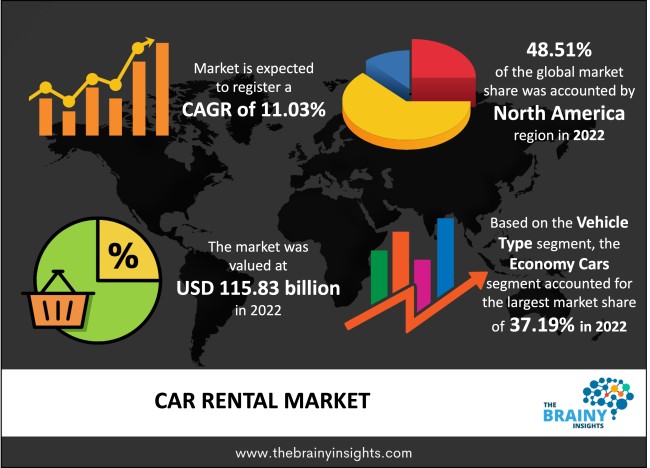The Road Ahead: How the Car Rental Industry is Evolving - Market2033/Brainy_Blogs GitHub Wiki
The global car rental market is experiencing rapid expansion, driven by evolving travel patterns, the rise of digital booking platforms, and increasing demand for flexible mobility solutions. As industries embrace digital transformation, the car rental sector is witnessing a surge in technological advancements, enhancing customer experience and operational efficiency.
Market Introduction
The car rental industry has become a vital component of the transportation sector, catering to business travelers, tourists, and daily commuters. With a growing focus on convenience and cost-effectiveness, consumers are opting for rental services over car ownership. Additionally, the increasing integration of electric vehicles (EVs) into rental fleets is reshaping the market landscape.
The global car rental market generated USD 115.83 billion in revenue in 2022 and is expected to grow at a CAGR of 11.03% from 2023 to 2032, reaching an estimated USD 329.78 billion by 2032.

Market Dynamics
Several factors are propelling the growth of the car rental market, including rising urbanization, increased disposable income, and the proliferation of app-based rental services. The industry is also benefiting from the rising trend of subscription-based car rentals, offering customers flexible and hassle-free mobility solutions. Moreover, sustainability initiatives are prompting companies to invest in fuel-efficient and electric vehicles to reduce their carbon footprint.
Regional Insights
- North America: Leading the market with strong corporate demand and widespread adoption of digital rental platforms.
- Europe: Witnessing steady growth, supported by robust tourism and government policies promoting EV adoption.
- Asia-Pacific: Emerging as a key growth hub, driven by rapid urbanization, expanding middle-class population, and increased business travel.
- Latin America & Middle East: Experiencing moderate growth with rising infrastructure investments and evolving consumer preferences.
Challenges and Opportunities
While the car rental market is thriving, challenges such as regulatory hurdles, fluctuating fuel prices, and intense competition pose obstacles to sustained growth. However, advancements in AI-driven fleet management, blockchain for secure transactions, and self-driving rental vehicles present significant opportunities for innovation and expansion.
Key Trends
- Adoption of AI and IoT for enhanced fleet management.
- Growing demand for electric and hybrid rental vehicles.
- Expansion of peer-to-peer car-sharing models.
- Integration of contactless rental services and digital payment solutions.
- Development of long-term subscription-based rental plans.
Key Players
Prominent companies shaping the car rental industry include:
Avis Budget Group, Inc., Al Futtaim Group, Bettercar Rental, Carzonrent India Pvt. Ltd., China Auto Rental, Eco Rent A Car, Enterprise Rent-A-Car, Europcar, Fast Rent a Car, Gataround, Localiza, National Car Rental, OLA,SOCAR Malaysia, SIXT, Shenzhen Topone Car Rental Co. Ltd, The Hertz Corporation, TT Car Transit, Toyota, Uber Technologies, Inc., Zoomcar, Zipcar
Request to Download Sample Research Report- https://www.thebrainyinsights.com/enquiry/sample-request/13866
Conclusion
The car rental market is poised for dynamic growth, fueled by evolving consumer behavior, technological advancements, and the rise of sustainable mobility solutions. Industry players must adapt to changing trends and invest in innovation to remain competitive in this fast-evolving landscape.